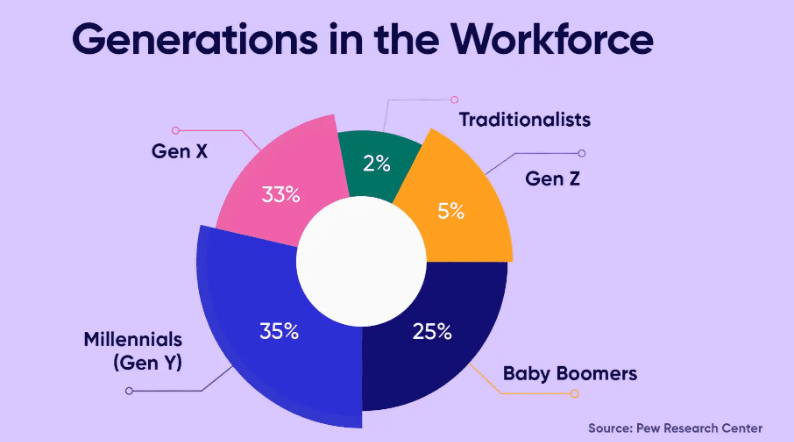In this age of digital transformation, we rely on technology to provide answers to run our business, BUT there still is an element of “human interaction” with many jobs. The need to understand one another and retain talent is critical.
We are constantly being asked to communicate, motivate, and collaborate with our team to get the job done – whether it’s increasing shareholder value, providing “Exceptional” customer service, closing the deal, making a profit, and more. In today’s workforce, we lead multiple generations: Baby Boomers, Generation X, Generation Y/Millennials, and Generation Z.

Each are driven by different values and concerns. Each is considered a “trouble maker” for the generations before or after them, so the question is: CAN WE LEAD THEM ALL EFFECTIVELY?
YES, we can! To begin with, it’s a growth-mindset. As leaders, one must think: Do we need ‘them’ more than they need us? If the answer is yes, we must understand what motivates and drives them in order to accomplish a shared purpose and goals. Each generation is uniquely shaped and impacted by the world they grew-up in. This impacts their values and concerns.
What are the values and concerns that shape how we lead each generation?
- Baby Boomers (Born mid1940s – mid1960s): This either the “Leading Edge or Generation Jones.” Boomers experienced Vietnam and Watergate. Man went to the moon and conquered space. Feminism became prominent. TVs started to became more common in homes that exposed families to what was happening in the world; thus, Boomers questioned authority and wanted independence. Boomers “Live to Work”.
- Individualism and personal gratification
- Optimistic, idealistic, competitive, and focused
- Hard work and achievement to stand out
- Be involved and seek personal growth
- Value job security
- Planned for the third age, not retirement (some by choice, some by necessity)
Values & Concerns:
- Gen X (Born 1960s – late 1970s): This is the “MTV” generation that I am a part of. During this time the Internet boomed, so there was more information spread across the world. We had major world events like Berlin Wall coming down with Former President Reagan’s famous speech “Tear Down This Wall.” There were delays in legislation passed such as FMLA (Family Medical Leave Act). As a result, there was double-income families to support expenses. We were the “Latch Key” kids: coming home to empty homes after school while both parents worked. Gen X “Work to Live.”
Values & Concerns:
-
- Independence and self-reliant
- Value diversity and work-life balance
- Resourceful, hardworking, pragmatic
- Delay having families to focus on career. At the same time, takes family life seriously.
- Entrepreneurial and tech savvy. More and more Gen Xers have their own business as a “second” career chapter.
- Gen Y/Millennials (Born late 1970s – 1990s). The “Snapchat” generation. Their world is Internet-based. This generation was faced with school shootings and terrorism such as 9/11. This fear caused the rise of “Helicopter Parents.” This happened to them.
Values & Concerns:
-
- Authenticity
- Optimistic, informal, digital savvy (Excited about AI), multi-taskers
- Value diversity
- Take civic/community duty seriously, “Green”
- Value ongoing learning
- Achievement/goal-oriented
- Team-oriented
- Gen Z (late 1990s- early 2012): The “Inclusive” generation. Gen Z had to grow up with recession and the pandemic. Their world revolves around communicating through their devices. WIFI is a must (They will freakout without it.) They use “crowd-source” to solve everything. GenZ has short attention spans. They are conscience of good and safe choices. There is overall lower drug abuse, teenage pregnancies compared to previous generations.
-
- Self-techies
- Confident
- Innovative – brings fresh ideas
- Everything is a competition
- Inclusive – Celebrates individuals where they are at.
- Cares about making a positive impact (planet)
- Passionate about equality and social justice
How do these values and concerns shape the way we lead?
Here are tips on how you can effectively lead:
- Baby Boomers
- Show respect for their skills and knowledge
- Choose face to face communication over technology (email or chats)
- Give them opportunities for face-time
- Teamwork and relationship building is important
- Be loyal
- Set them up as mentors
- Gen X
- Respect time – Get to the point
- Let them work independently – Don’t micro-manage!
- Show trust & confidence
- Offer flexibility
- Respect productivity over tenure
- Collaborative decision making – Seek input from others
- Provide opportunities for learning
- Millennials
- Give them challenging work
- Ask their opinion
- Provide timely, immediate, and consistent specific feedback
- Put them in teams to get the job done
- Be given immediate responsibility and ownership
- Provide opportunities for continuous learning and development/Assign a mentor
- Gen Z
- Prioritize empathy
- Honesty
- Be transparent
- Purpose-led company vision
- Tell a story to connect
- Foster a coaching culture
- Favors digital communication platforms (instant messaging, social media)
- Empower them to take the lead
Keep in-mind these are generalizations. Individualism always trumps generational differences. Ultimately, understand the person. Intentional communication is key to success and will enhance your relationship with your team to get the results you desire. Celebrate the individual.
